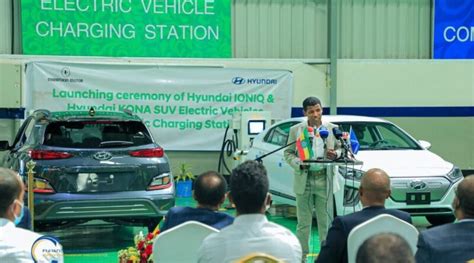Ethiopia, a country known for its rich cultural heritage and stunning landscapes, is now making strides towards a greener future with the expansion of its electric vehicle (EV) charging infrastructure. The Ethiopian government recently unveiled ambitious plans to enhance the EV charging network across the nation, marking a significant step towards reducing reliance on fossil fuels and embracing sustainable transportation solutions.
The Vision for Electric Mobility
Bahru Oljra, Executive Director of Energy Sector Control at the Petroleum and Energy Authority of Ethiopia, revealed that new charging stations will be strategically placed every 50 to 120 kilometers. This move aims to address the range anxiety commonly associated with EVs by providing convenient access to charging facilities for motorists traveling long distances. Oljra highlighted that Ethiopia currently offers three types of charging stations – at private residences, public locations, and commercial areas – with service fees applicable at commercial sites.
This initiative forms part of a broader strategy by Ethiopian authorities to revamp the country’s transportation sector and propel it into a new era of clean energy mobility. By fostering an environment conducive to electric vehicles, Ethiopia seeks to curb carbon emissions, combat climate change, and embrace cutting-edge technological innovations in line with global sustainability trends.
A Paradigm Shift in Policy
In a groundbreaking move in January 2024, Ethiopia made headlines by becoming the first nation to prohibit the importation of non-electric vehicles. The Ministry of Transport and Logistics justified this bold decision by emphasizing the economic benefits derived from transitioning away from traditional petrol and diesel vehicles. As part of its commitment to promoting EV adoption, the government introduced lucrative incentives such as duty-free imports for EV components destined for local assembly.
Bareo Hassen, Minister of Transport and Logistics, underscored that embracing electric mobility would not only bolster Ethiopia’s economy but also lead to substantial savings in foreign exchange expenditure typically allocated towards fuel imports each year. With more than 100,000 operational EVs already on Ethiopian roads today – a number set to skyrocket as authorities aim to replace 95% of conventional vehicles with electric alternatives over the next decade – there is palpable excitement surrounding the potential growth trajectory within the country’s burgeoning EV market.
Experts’ Insights
Industry experts have lauded Ethiopia’s proactive stance on promoting electric vehicles as a crucial step towards achieving environmental sustainability targets. Driven by mounting concerns over climate change and air pollution linked to traditional combustion engines, countries worldwide are increasingly turning their focus towards electrification as a cleaner alternative for urban mobility.
Professor Sarah Chang from GreenTech Research Institute shared her perspective on Ethiopia’s green transition: “By prioritizing investments in EV infrastructure and incentivizing domestic manufacturing capabilities, Ethiopia is positioning itself as a trailblazer in sustainable transport solutions within Africa.” She emphasized that fostering collaboration between policymakers, industry stakeholders, and consumers would be pivotal in ensuring a seamless transition towards widespread adoption of electric vehicles across diverse socioeconomic segments.
As road transport remains a significant contributor to global greenhouse gas emissions accounting for approximately 30% of total output, initiatives like Ethiopia’s push towards electrification play an integral role in mitigating environmental impact while fostering economic resilience through innovative technology-driven pathways.
In conclusion,…

